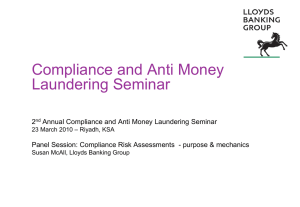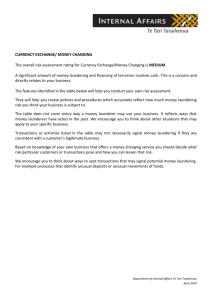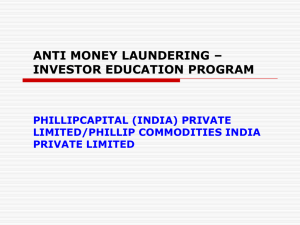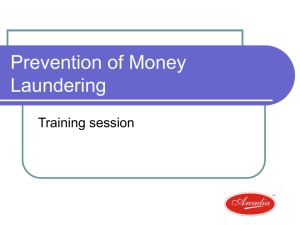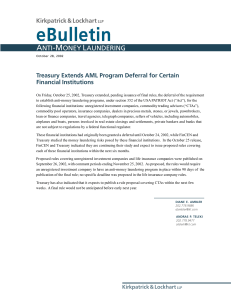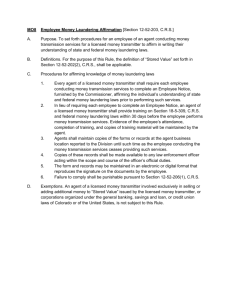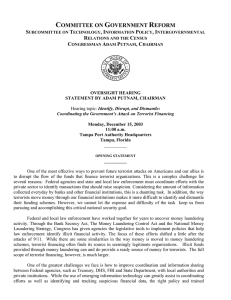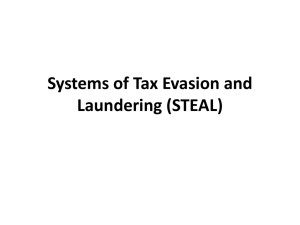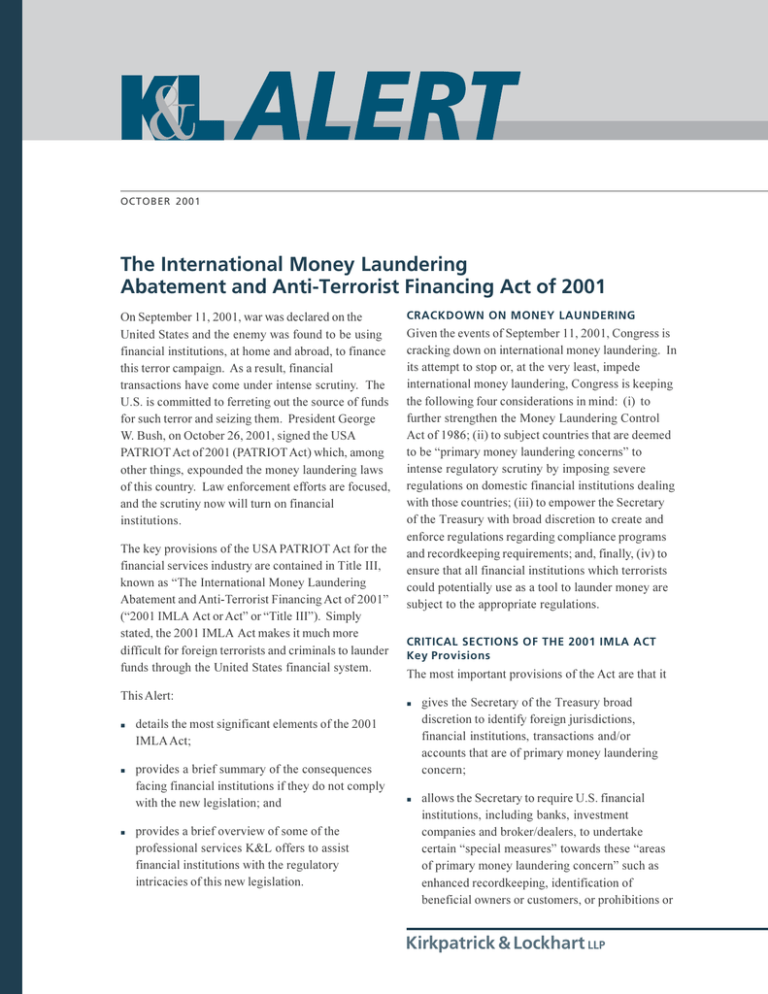
OCTOBER 2001
The International Money Laundering
Abatement and Anti-Terrorist Financing Act of 2001
On September 11, 2001, war was declared on the
United States and the enemy was found to be using
financial institutions, at home and abroad, to finance
this terror campaign. As a result, financial
transactions have come under intense scrutiny. The
U.S. is committed to ferreting out the source of funds
for such terror and seizing them. President George
W. Bush, on October 26, 2001, signed the USA
PATRIOT Act of 2001 (PATRIOT Act) which, among
other things, expounded the money laundering laws
of this country. Law enforcement efforts are focused,
and the scrutiny now will turn on financial
institutions.
The key provisions of the USA PATRIOT Act for the
financial services industry are contained in Title III,
known as The International Money Laundering
Abatement and Anti-Terrorist Financing Act of 2001
(2001 IMLA Act or Act or Title III). Simply
stated, the 2001 IMLA Act makes it much more
difficult for foreign terrorists and criminals to launder
funds through the United States financial system.
This Alert:
n
n
n
CRACKDOWN ON MONEY LAUNDERING
Given the events of September 11, 2001, Congress is
cracking down on international money laundering. In
its attempt to stop or, at the very least, impede
international money laundering, Congress is keeping
the following four considerations in mind: (i) to
further strengthen the Money Laundering Control
Act of 1986; (ii) to subject countries that are deemed
to be primary money laundering concerns to
intense regulatory scrutiny by imposing severe
regulations on domestic financial institutions dealing
with those countries; (iii) to empower the Secretary
of the Treasury with broad discretion to create and
enforce regulations regarding compliance programs
and recordkeeping requirements; and, finally, (iv) to
ensure that all financial institutions which terrorists
could potentially use as a tool to launder money are
subject to the appropriate regulations.
CRITICAL SECTIONS OF THE 2001 IMLA ACT
Key Provisions
The most important provisions of the Act are that it
n
details the most significant elements of the 2001
IMLA Act;
provides a brief summary of the consequences
facing financial institutions if they do not comply
with the new legislation; and
provides a brief overview of some of the
professional services K&L offers to assist
financial institutions with the regulatory
intricacies of this new legislation.
n
gives the Secretary of the Treasury broad
discretion to identify foreign jurisdictions,
financial institutions, transactions and/or
accounts that are of primary money laundering
concern;
allows the Secretary to require U.S. financial
institutions, including banks, investment
companies and broker/dealers, to undertake
certain special measures towards these areas
of primary money laundering concern such as
enhanced recordkeeping, identification of
beneficial owners or customers, or prohibitions or
Kirkpatrick & Lockhart LLP
conditions on opening and maintaining certain
accounts;
n
n
n
n
requires financial institutions, such as banks,
investment companies and broker/dealers that
establish, maintain, administer or manage private
banking accounts or correspondent accounts for
non-U.S. persons to establish appropriate, specific
and, where necessary, enhanced due diligence
policies, procedures and controls that are
reasonably designed to detect and report
instances of money laundering through these
accounts;
forbids financial institutions from establishing,
maintaining, administering or managing a
correspondent account or other similar account in
the U.S. for a foreign bank that does not have a
physical presence in any country (a shell bank),
unless such bank is an affiliate of certain entities
that have a physical presence in the U.S. and is
supervised by the regulatory authority that
regulates its affiliate;
requires financial institutions to improve their
verification of account holders and to enhance
their money laundering practices and procedures;
and
prohibits the bulk smuggling of cash which is now
a criminal offense.
Special Measures for Jurisdictions, Financial
Institutions, or International Transactions of
Primary Money Laundering Concern
Section 311 applies to financial institutions as
defined by chapter thirty-one of the Code of Federal
Regulations. The different institutions listed there
run the gambit from insured banks to broker/dealers
to currency exchanges. This section of the Act
revolves around the Secretary of the Treasurys
ability to designate a jurisdiction outside the United
States, one or more financial institutions operating
outside the United States, one or more classes of
transactions within or involving a jurisdiction
outside the United States, or one or more types of
accounts as a primary money laundering concern.
This determination is at the sole discretion of the
Secretary of the Treasury, although consultation with
the Attorney General and Secretary of State are
required.
2
The Secretary is required to take seven factors into
account when he designates a jurisdiction, account,
etc. as a primary money laundering concern: (i) the
presence of terrorists or organized crime in the
jurisdiction; (ii) the jurisdictions use of bank secrecy
and tax benefits for non-residents; (iii) the presence
of money laundering laws; (iv) the volume of
transactions in relation to the size of the economy;
(v) international anti-money laundering
organizations characterization of the jurisdiction as a
money laundering haven; (vi) the history of
cooperation in previous money laundering cases;
and finally, (vii) the presence of internal corruption.
Once a jurisdiction is deemed a primary money
laundering concern, the Secretary may impose any
or all of the following five special measures.
First, the Secretary may require that a financial
institution dealing with a primary money laundering
concern keep records detailing who owns the
account, their address, the originator of the funds in
the account, the identity of any beneficial owners,
and a record of all account transactions. Second, the
Secretary may require that any accounts held by a
financial institution on behalf of a foreign entity
which has been deemed a primary money laundering
concern contain detailed records regarding the
beneficial owner of that account. Third, the
Secretary may require financial institutions keeping
pay-through accounts for a bank in a jurisdiction
deemed a primary money laundering concern to
determine the identity of each customer who is
permitted to use the account, and other information
that they would be required to obtain had the
account been opened for a U.S. citizen. Fourth, the
same information required for pay-through accounts
must be obtained for the use of correspondent
accounts as well. Finally, the Secretary, only through
issuing a regulation, can prohibit the use of, or shut
down, an existing correspondent or pay-through
account if he found the accounts were linked to a
jurisdiction designated a primary money laundering
concern.
Compliance with special measures detailed above
is the responsibility of any financial institution as
defined in 31 USC §5312(a)(2). In other words, any
financial institution conducting business with a
primary money laundering concern (including a
foreign bank charted by a country which is a primary
KIRKPATRICK & LOCKHART LLP ALERT
money laundering concern) must strictly follow
know your customer type rule and employ a
heightened sense of due diligence when establishing
these types of accounts to avoid potential problems
with law enforcement or the Department of the
Treasury.
Special Due Diligence for Correspondent Accounts
and Private Banking Accounts
Section 312 of the Act requires any domestic financial
institution with private banking or correspondent
accounts in the United States for a non-United
States person to establish appropriate, specific,
and, where necessary, enhanced due diligence
policies, procedures, and controls that are reasonably
designed to detect and report instances of money
laundering through those accounts. This
requirement to establish know your customer type
due diligence policies and procedures applies to
private banking or correspondent accounts
maintained by a financial institution for any nonUnited States person and not just persons from
countries designated as primary money laundering
concerns.
Minimum due diligence procedures and controls on
private banking accounts (i.e., having minimum
aggregate deposits of funds or assets in excess of
$1,000,000) obligate a financial institution to take
reasonable steps to identify the nominal and
beneficial owners of, and source of funds deposited
to, the account. In addition, enhanced scrutiny is
required on any private banking account maintained
by a senior foreign political figure, their immediate
family members or loose associates to detect and
report transactions that may involve the proceeds of
foreign corruption.
The Act does not specify what are satisfactory
minimum due diligence policies for correspondent
accounts. It does, however, require enhanced due
diligence policies, procedures and controls for any
correspondent account maintained by a foreign bank
operating under an offshore banking license (i.e.,
chartered to conduct banking activities outside, but
not in, the country in which it is chartered); or
operating under a charter issued by a foreign country
designated as a primary money laundering concern
by the Secretary of the Treasury or as non-
OCTOBER 2001
cooperative by an international anti-money
laundering group of which the United States is a
member (e.g., Financial Action Task Force on Money
Laundering).
If a financial institution is obligated to impose
enhanced due diligence policies, procedures and
controls on a particular correspondent account, it
must fulfill three requirements. First, it must identify
each of the owners of the foreign bank maintaining
the correspondent account and discern the nature
and extent of their ownership. Second, it must
discover if the foreign bank is conducting
correspondent business with offers of correspondent
services to other foreign banks. Finally, after making
this determination, the domestic financial institution
must identify all of those secondary foreign
correspondent banks and collect the same due
diligence information on those secondary
correspondent banks.
Shell Banks
The prohibition on conducting business with shell
banks contained in section 313 of the Act applies to
covered financial institutions (i.e., banks and
registered broker/dealers described in 31 U.S.C.
§5312(a)(2) (A through G)). The section prohibits
any of these financial institutions from establishing a
correspondent account with or for a shell bank. In
addition, any foreign bank maintaining a
correspondent account with a U.S. bank is prohibited
from maintaining a correspondent account with a
foreign shell bank. It is the duty of the U.S. financial
institution to discern whether the foreign banks they
maintain correspondent accounts for maintain
correspondent accounts for foreign shell banks.
Financial institutions will be required to comply with
this law within 60 days.
Bulk Cash Smuggling
Until now, cash smuggling has not been a criminal
offense in the United States. The Act, in section 371,
makes the smuggling of cash into or out of the
United States, or across state lines, a federal offense.
Bulk cash smuggling is a crucial step in the money
laundering process. Once the criminal has moved his
money out of the U.S. to have it laundered, he needs
a way to get it back clean. Often this is accomplished
by having several people smuggle the clean cash
Kirkpatrick & Lockhart LLP
3
back into the U.S. The criminalization of bulk cash
smuggling is important to the finance and banking
community because the Act allows for the seizure of
any funds traceable to the smuggled cash. Therefore,
this provision has the potential to injure financial
institutions that accept cash or property as collateral
for loans that could eventually be traced to
smuggled cash.
evidence that an institution was willfully blind to the
money laundering occurring under its nose. Lack of
compliance procedures would likely provide the
government with all of the evidence it would need to
convict a financial institution for money laundering.
In addition, the maximum fine which may be imposed
for money laundering, whether civil or criminal, has
been increased to one million dollars.
FAILURE TO COMPLY WITH THE ACT’S
PROVISIONS RESULTS IN HARSH
CONSEQUENCES
K&L EXPERIENCE
The government takes the crime of money laundering
seriously. Not only does the Act require that
financial institutions maintain extensive know your
customer information, but it also makes the Financial
Crimes Enforcement Network (FinCEN) a bureau of
the Department of the Treasury. The Act
appropriates money to increase the role of FinCEN,
and also requires that FinCEN maintain a government
wide data service encompassing all CTRs and SARs.
Current penalties established for failure to comply
with CTR requirements will apply to the failure of
financial institutions to keep the additional
information required by the Act. In the past, the
government and law enforcement have not taken
every opportunity to criminally charge financial
institutions who fail to comply with reporting and
recordkeeping requirements. There is every reason to
believe, however, that financial institutions who do
not undertake a due diligence and compliance policy
immediately, in response to this act, will only be
inviting enhanced scrutiny by law enforcement over
every aspect of their business.
If a financial institution fails to put in place
procedures designed to ensure compliance with the
Act, and law enforcement discovers the presence of
money laundering, that institution could be charged
criminally. The government only needs to discover
Kirkpatrick & Lockhart LLP has diverse experience in
issues involving or related to money laundering to
help banking and diversified financial services
clients assess their risk, establish and review
compliance practices, investigate potential
weaknesses, perform internal investigations, and
respond to regulatory inquiries and enforcement
actions while being sensitive to the privacy of each
client and their customers through an effective
attorney-client privilege relationship.
If you have any questions concerning the bill, its
requirements, or K&Ls experience in this area or if
you would like a copy of this bill in its entirety,
please call or e-mail any of the following:
BOSTON:
Stanley V. Ragalevsky 617.951.9203
Michael S. Cacesse
617.261.3133
D. Lloyd Macdonald
617.261.3117
sragalevsky@kl.com
mcacesse@kl.com
dmacdonald@kl.com
NEWARK:
Marc W. Farley
973.848.4031
mfarley@kl.com
212.536.3941
212.536.3905
rmarshall@kl.com
eciko@kl.com
412.355.8333
mrush@kl.com
415.249.1010
415.249.1015
rphillips@kl.com
dmishel@kl.com
202.778.9080
202.778.9369
202.778.9886
dthornburgh@kl.com
bhaskin@kl.com
dambler@kl.com
NEW YORK:
Richard D. Marshall
Eva M. Ciko
PITTSBURGH:
Mark A. Rush
SAN FRANCISCO:
Richard M. Phillips
David Mishel
WASHINGTON DC:
Dick Thornburgh
Benjamin J. Haskin
Diane E. Ambler
SM
Kirkpatrick & Lockhart LLP
Challenge us.
BOSTON
l
DALLAS
l
HARRISBURG
l
LOS ANGELES
l
MIAMI
l
NEWARK
l
NEW YORK
l
PITTSBURGH
l
SAN FRANCISCO
l
WASHINGTON
.........................................................................................................................................................
This publication/newsletter is for informational purposes and does not contain or convey legal advice. The information herein
should not be used or relied upon in regard to any particular facts or circumstances without first consulting with a lawyer.
© 2001 KIRKPATRICK & LOCKHART LLP. ALL RIGHTS RESERVED.
SM

